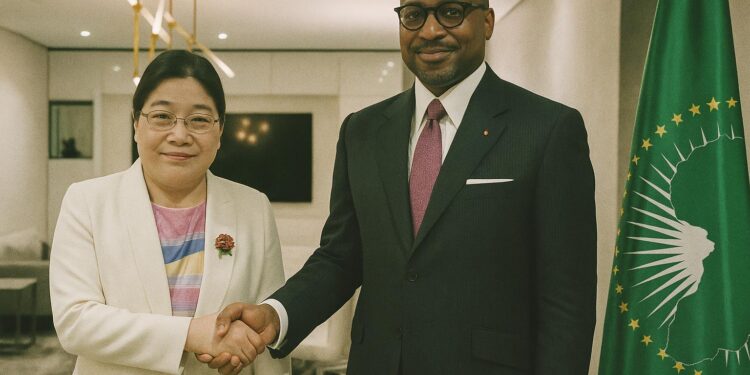Diplomatic Gesture With Strategic Resonance
The announcement by Chinese ambassador An Qing that Beijing wishes to designate Brazzaville as the inaugural beneficiary of its sweeping zero-tariff initiative landed with the quiet force of a diplomatic drumbeat. In the courtyard of the Ministry of International Cooperation, where Denis Christel Sassou Nguesso received the envoy, the language employed emphasised “mutually beneficial results”—a phrasing that has become shorthand for Beijing’s contemporary engagement on the continent (FOCAC communiqué 2021). By singling out Congo, China signals both confidence in the political continuity of President Denis Sassou Nguesso’s administration and an appetite to deepen a bilateral relation that has evolved steadily since diplomatic ties were upgraded to a comprehensive strategic partnership in 2016.
Economic Stakes for Brazzaville’s Diversification Drive
Over 80 % of Congolese export revenue still originates in hydrocarbons, a concentration that exposes fiscal balances to Brent price volatility (IMF 2023). Preferential access to the world’s second-largest consumer market therefore offers Brazzaville a concrete path toward diversification. Agricultural products such as cocoa, coffee and timber, which face tariffs of up to 15 % in normal circumstances, would enter China duty-free, potentially enhancing competitiveness against suppliers from Southeast Asia. Government technocrats quietly note that even a two-point increase in non-oil exports could widen the tax base and buttress the 2024–2028 National Development Plan, which pledges to lift non-oil growth beyond 5 %.
Beijing’s Calculus: Symbolism and Supply-Chain Security
In Beijing, the initiative is understood as both developmental diplomacy and geopolitical hedging. Since late 2022, the Ministry of Commerce has redrafted tariff lines for African least-developed countries to secure alternative suppliers for commodities ranging from manganese to tropical timber (Ministry of Commerce 2022). Granting Congo the premiere slot carries symbolic heft: the country is neither the largest African economy nor China’s top trading partner on the continent, yet it is a reliable interlocutor that has endorsed the Global Development Initiative at multilateral fora. Chinese analysts interpret the choice as a demonstration that Beijing rewards steadfast political alignment as much as sheer market size.
Administrative Bottlenecks and Capacity-Building Needs
Ambassador An Qing’s request for an accelerated bureaucratic timetable underscores a less glamorous reality: Congolese exporters must still meet China’s stringent phytosanitary and traceability requirements before a single container can sail tariff-free. The Ministries of Trade and Agriculture are drafting conformity protocols, but capacity gaps persist in laboratory testing and digital customs clearance. Technical assistance, possibly financed through the Chinese-funded Liandu agricultural cooperation zone outside Pointe-Noire, is being negotiated to bridge those gaps. Officials familiar with the talks mention a six-month pilot phase during which only a limited roster of products—likely cocoa and sawn timber—will be eligible.
Regional Ripple Effects and the Multilateral Canvas
Should Brazzaville succeed in operationalising the agreement, neighbouring states will inevitably measure the competitive drag of not enjoying similar terms. Economists at the African Development Bank suggest the arrangement could nudge Central African exporters toward value-addition at home to retain market share in China. On a broader canvas, Beijing’s choice dovetails with ongoing negotiations within the African Continental Free Trade Area, where member states debate rules of origin and external tariff schedules. Congo, often perceived as a secondary voice in those deliberations, may find its leverage subtly enhanced.
Measured Optimism on the Eve of Implementation
Neither Brazzaville nor Beijing is given to public exuberance, and both sides frame the initiative as an incremental step rather than a silver bullet. Yet for a country contemplating post-oil horizons and a partner seeking to showcase pragmatic multilateralism, the prospect of tariff-free trade offers a shared narrative of opportunity. As one senior Congolese diplomat remarked in a guarded aside, “The real test will not be the signing ceremony but the first shipment cleared at zero duty.” If that test is met, the Congo may discover that the Silk Road now has a tributary flowing from the banks of the Congo River.












































